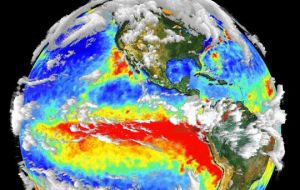MercoPress. South Atlantic News Agency
2009 was the hottest year on record south of the Equator, says Science
 El Niño, a cyclic warming event in the tropical Pacific has much to do with the extreme temperatures registered
El Niño, a cyclic warming event in the tropical Pacific has much to do with the extreme temperatures registered The United States and Europe may be experiencing one of the coldest winters in decades, but things continue to heat up in the Southern Hemisphere. Science magazine has obtained exclusive data from NASA that indicates that 2009 was the hottest year on record south of the Equator. The find adds to multiple lines of evidence showing that the 2000s were the warmest decade in the modern instrumental record.
Southern Hemisphere temperatures can serve as a trailing indicator of global warming, says NASA mathematician Reto Ruedy of the Goddard Institute for Space Studies in New York City, given that that part of the globe is mostly water, which warms more slowly and with less variability than land. Ruedy says 2009 temperatures in the Southern Hemisphere were 0.49°C warmer than the period between 1951 and 1980, with an error of +/- 0.05°C.
That makes 2009 the warmest year on record in that hemisphere. That's significant because the second-warmest year, 1998, saw the most severe recorded instance in the 20th century of El Niño, a cyclic warming event in the tropical Pacific. During El Niño events, heat is redistributed from deep water to the surface, which raises ocean temperatures and has widespread climatic effects. But last year was an El Niño year of medium strength, which Ruedy says might mean that the warmer temperatures also show global, long-term warming as well as the regional trend.
The data come a month after announcements by the National Oceanic and Atmospheric Administration (NOAA) and by the World Meteorological Organization that the decade of the 2000s was warmer than the 1990s. (NOAA estimates that the decade was 0.54°C warmer than the 20th century average. The 1990s, by comparison, was 0.36°C warmer by their measure.)
Meanwhile, NOAA is expected to announce possible record highs in the tropics when it releases its final report on 2009 temperatures on Friday. “This is one of the coldest winters we've experienced in a while up here in the northern latitudes,” says Derek Arndt of NOAA's National Climatic Data Centre in Asheville, North Carolina. “But we're piling up a lot of heat in the tropics.”




Top Comments
Disclaimer & comment rulesCommenting for this story is now closed.
If you have a Facebook account, become a fan and comment on our Facebook Page!